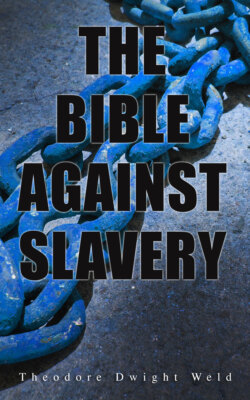The Bible Against Slavery

Реклама. ООО «ЛитРес», ИНН: 7719571260.
Оглавление
Theodore Dwight Weld. The Bible Against Slavery
The Bible Against Slavery
Table of Contents
THE BIBLE AGAINST SLAVERY
DEFINITION OF SLAVERY
IMPORT OF "BUY," AND "BOUGHT WITH MONEY."
II.—THE LEADING DESIGN OF THE LAWS RELATING TO SERVANTS, WITH THE RIGHTS AND PRIVILEGES SECURED TO THEM
III.—DID PERSONS BECOME SERVANTS VOLUNTARILY, OR WERE THEY MADE SERVANTS AGAINST THEIR WILLS?
IV.—WERE THE SERVANTS FORCED TO WORK WITHOUT PAY?
V.—WERE MASTERS THE PROPRIETORS OF SERVANTS AS LEGAL PROPERTY?
OBJECTIONS CONSIDERED
Отрывок из книги
Theodore Dwight Weld
An inquiry into the Patriarchal and Mosaic systems on the subject of Human Rights
.....
We proceed to state affirmatively that, enslaving men is reducing them to articles of property—making free agents, chattels—converting persons, into things—sinking immortality, into merchandize. A slave is one held in this condition. In law, "he owns nothing, and can acquire nothing." His right to himself is abrogated. If he say my hands, my feet, my body, my mind, myself, they are figures of speech. To use himself for his own good, is a crime. To keep what he earns, is stealing. To take his body into his own keeping, is insurrection. In a word, the profit of his master is made the end of his being, and he, a mere means to that end—a mere means to an end into which his interests do not enter, of which they constitute no portion.1Man, sunk to a thing! the intrinsic element, the principle of slavery; men, bartered, leased, mortgaged, bequeathed, invoiced, shipped in cargoes, stored as goods, taken on executions, and knocked off at public outcry! Their rights, another's conveniences; their interests, wares on sale; their happiness, a household utensil; their personal inalienable ownership, a serviceable article, or a plaything, as best suits the humor of the hour; their deathless nature, science, social affections, sympathies, hopes—marketable commodities! We repeat it, the reduction of persons to things; not robbing a man of privileges, but of himself; not loading with burdens, but making him a beast of burden; not restraining liberty, but subverting it; not curtailing rights, but abolishing them; not inflicting personal cruelty, but annihilating personality; not exacting involuntary labor, but sinking him into an implement of labor; not abridging human comforts, but abrogating human nature; not depriving an animal of immunities, but despoiling a rational being of attributes—uncreating a man, to make room for a thing!
That this is American slavery, is shown by the laws of slave states. Judge Stroud, in his "Sketch of the Laws relating to Slavery," says, "The cardinal principle of slavery, that the slave is not to be ranked among sentient beings, but among things—obtains as undoubted law in all of these (the slave) states." The law of South Carolina thus lays down the principle, "Slaves shall be deemed, held, taken, reputed, and adjudged in law to be chattels personal in the hands of their owners and possessors, and their executors, administrators, and assigns, to all intents, constructions, and purposes whatsoever."—Brevard's Digest, 229. In Louisiana, "A slave is one who is in the power of a master to whom he belongs; the master may sell him, dispose of his person, his industry, and his labor; he can do nothing, possess nothing, nor acquire any thing, but what must belong to his master."—Civ. Code of Louisiania, Art. 35.
.....